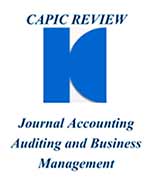Barriers and support needs in strategic thinking learning For accounting students
Published 2023-05-06
Keywords
- professional learning,
- softskills,
- professional development,
- accounting education,
- strategic thinking
How to Cite
Copyright (c) 2022 Maria Teresa Martinez-Larraín, Guillermo Rebolledo-Sanchez

This work is licensed under a Creative Commons Attribution-NonCommercial-ShareAlike 4.0 International License.
Abstract
Both the regulatory institutions and recent literature, stress the key importance of soft
skills, along with the other necessary skills, as required knowledge for the professional development
of accounting students. Thinking skills and reflective change management are relevant
to shape professionals who are both adaptable and self-aware.
The objective of this research is to identify not only the obstacles that accounting students
face, in two Chilean public universities, but also the support needs they require when learning
new tools to develop strategic thinking, based on the principle of continuous improvement,
and the understanding of the challenge of enriching their personal and professional
education.
Action research was carried out using a Tutorial Device at Formative level (DOT-F in
Spanish), with undergraduate students aimed at enhancing the skills and attitudes that need
to be integrated with the disciplinary and technical knowledge of the syllabus.
The most important findings confirm that SWOT analysis is useful and easy to remember,
that the most common obstacle is to relate more than two cross-variables as a basis for a strategic
design, and finally that the process requires a high level of abstract thought. In terms of
the support needed, evaluate “collaborative work variable” is key to the process, as well as
the strengthening of a personal and professional “development mindset” on the part of the
students.
Downloads
References
- Aaltola, P. (2019). Strategic thinking and accounting: potentials and pitfalls from a managerial perspective. Journal of Management Control. 30 (3), 323-351. https://doi.org/10.1007/s00187-019-00285-w
- Ackerman, J. (2011). Hu Effect of type of curriculum on educational outcomes and motivation among marketing students with different learning styles Journal of Marketing Education, 33 (2011), 273-284, https://doi.org/10.1177/0273475311420233
- AlMarwani, M. (2020). Pedagogical potential of SWOT analysis: An approach to teaching critical thinking. Thinking Skills and Creativity, 38 doi:10.1016/j.tsc.2020.100741 https://www.sciencedirect. com/science/article/abs/pii/S1871187120302157?via%3Dihubdoi:10.1016/j.tsc.2020.100741
- Bell, G., Rochford, L. (2016). Rediscovering SWOT’s integrative nature: A new understanding of an old framework, The International Journal of Management Education, 14(3) P. 310-326, https://doi. org/10.1016/j.ijme.2016.06.003.
- Cáceres, P. (2003) Análisis cualitativo de Contenido: Una alternativa metodológica alcanzable. Revista Psicoperspectivas. Individuo y Sociedad, 2(1). https://www.psicoperspectivas.cl/index.php/psicoperspectivas/ article/view/3
- Cassaretto Bardales, Mónica & Martínez Uribe, Patricia. (2017). Validación de las escalas de bienestar, de florecimiento y afectividad. Pensamiento Psicológico, 15(1), 19-31. https://doi.org/10.11144/Javerianacali.PPSI15-1.VEFA
- Colmenares E., Ana Mercedes; Piñero M., Ma. Lourdes (2008) La investigación acción. Una herramienta metodológica heurística para la comprensión y transformación de realidades y prácticas socioeducativas, Laurus, 14(27), pp. 96-114. http://www.scielo.org.co/scielo.php?script=sci_arttext&pid=S1657-89612017000100002
- Corona Jiménez, M. A. (2012). Desarrollo de pensamiento estratégico en la escuela de negocios. Contaduría y administración, 57(1), 103-122. http://www.scielo.org.mx/scielo.php?script=sci_arttext&pid=S0186-10422012000100006&lng=es&tlng=es.
- David ME, David FR, David FR. (2021) Closing the Gap between Graduates’ Skills and Employers’ Requirements: A Focus on the Strategic Management Capstone Business Course. Administrative Sciences, 11(1):10. https://doi.org/10.3390/admsci11010010
- Denegri Coria, M., González Rivera, N., Elgueta Sepúlveda, H., García Jara, C., Sepúlveda, J. A., Schnettler, B., Vivallo Urra, O., & Salazar Valenzuela, P.. (2018). Life Satisfaction in Chilean University Students: An Examination of the Relation between Gender and Socioeconomic Level. CES Psicología, 11(1), 40-55. https://doi.org/10.21615/cesp.11.1.4
- Dweck, CS, Walton, GM y Cohen, GL (2014). Tenacidad académica: Mentalidades y habilidades que promueven el aprendizaje a largo plazo. Obtenido del sitio web de la Escuela de Graduados en Educación de Stanford: https://ed.stanford.edu/sites/default/files/manual/dweck-waltoncohen-2014.pdf
- Formoso Mieres, A. A., Ramírez Escalona, T. y Sarduy Quintanilla, A. (2019). La relación universidad-sociedad en la formación integral de los estudiantes. Conrado, 15(67), 24-31. http://scielo.sld.cu/scielo.php?script=sci_arttext&pid=S1990-86442019000200024&lng=es&tlng=es.
- Gilligan, C. (2013) La ética del cuidado. Cuadernos de la Fundació Víctor Grífols i Lucas. Barcelona: Fundació Víctor Grífols i Lucas https://elibro.net/en/ereader/uvalparaiso/51750?page=9
- Grandy, G. & J. Mills A. (2004). Strategy as Simulacra? A Radical Reflexive Look at the Discipline and Practice of Strategy Canada Journal of Management Studies 41 (7), 1153-1170. https://doi. org/10.1111/j.1467-6486.2004.00470.x
- Hergüner, B.,(2021). Rethinking public administration education in the period of pandemic: Reflections of public administration students on online education through a SWOT analysis, Thinking Skills and Creativity, 41, 100863, https://doi.org/10.1016/j.tsc.2021.100863.
- Hernández Álvarez, Y., Massip Acosta, A., y Ramos Acevedo, I.. (2019). Acciones metodológicas y educativas para estimular en estudiantes universitarios actitudes protagónicas y de liderazgo. Conrado, 15(70), 320-329. http://scielo.sld.cu/scielo.php?script=sci_arttext&pid=S1990-86442019000500320&lng=es&tlng=es.
- Levy, A. (2012). El pensamiento estratégico como un proceso de aprendizaje. Revista Científica Visión de Futuro, 16(1). 1-17. http://www.scielo.org.ar/scielo.php?script=sci_arttext&pid=S1668-87082012000100006.
- Miglianico, M., Dubreuil, P., Miquelon, P., Bakker, A., Krumm, C-M. (2020). Strength Use in the Workplace: A Literature Review. Journal of Happiness Studies, Springer Verlag, 21(2), 737-764. https://doi.org/ff10.1007/s10902-019-00095-wff. ffhal-02932138f.
- Mintzberg, H. (1987). The Strategy Concept I: Five Ps For Strategy, California Management Review, 30 (1), 11-24 https://doi-org.bibliotecadigital.uv.cl/10.2307/41165263
- Martínez-Larrain M. & Rebolledo-Sánchez G., (2021) Propuesta para contribuir a la formación integral de profesionales de Ciencias Económicas, [Ponencia] (25-29 de Octubre 2021) XVI Congreso Chileno de Psicología. FACSO. Universidad de Chile, Santiago de Chile.
- Oshiro, K., Brison, N., Bennett, G. (2021). Personal branding project in a sport marketing class, Journal of Hospitality, Leisure, Sport & Tourism Education, 28, 1473-8376. https://doi.org/10.1016/j.jhlste. 2021.100308.
- Sepúlveda, M. (2013). Psicoterapia Evolutiva con Niños y Adolescentes. Santiago de Chile: Editorial Mediterráneo.
- Schön, D. (1992) La formación de profesionales reflexivos. Barcelona: Paidós.
- Tsiligiris, V., & Bowyer, D. (2021). Exploring the impact of 4IR on skills and personal qualities for future accountants: a proposed conceptual framework for university accounting education. Accounting Education, 30(6), 621–649. https://doi.org/10.1080/09639284.2021.1938616
- Vasilachis, I. (2006). Estrategias de investigación cualitativa, Barcelona: Gedisa.
- Yuni, J. A. (2005). Mapas y herramientas para conocer la escuela: investigación etnográfica e investigaciónacción, Cordova: Editorial Brujas https://elibro.net/en/ereader/uvalparaiso/76317?page=215



































